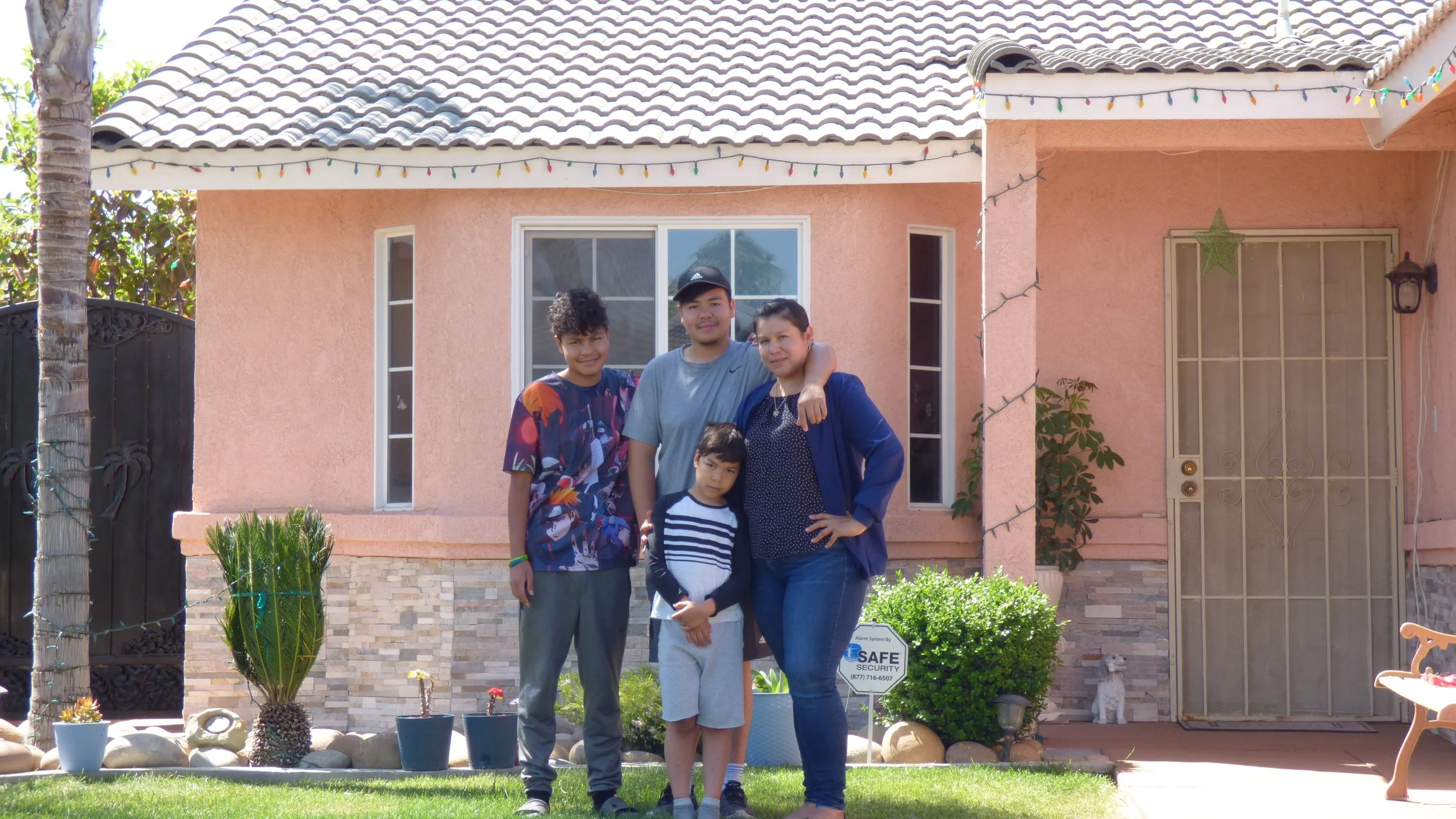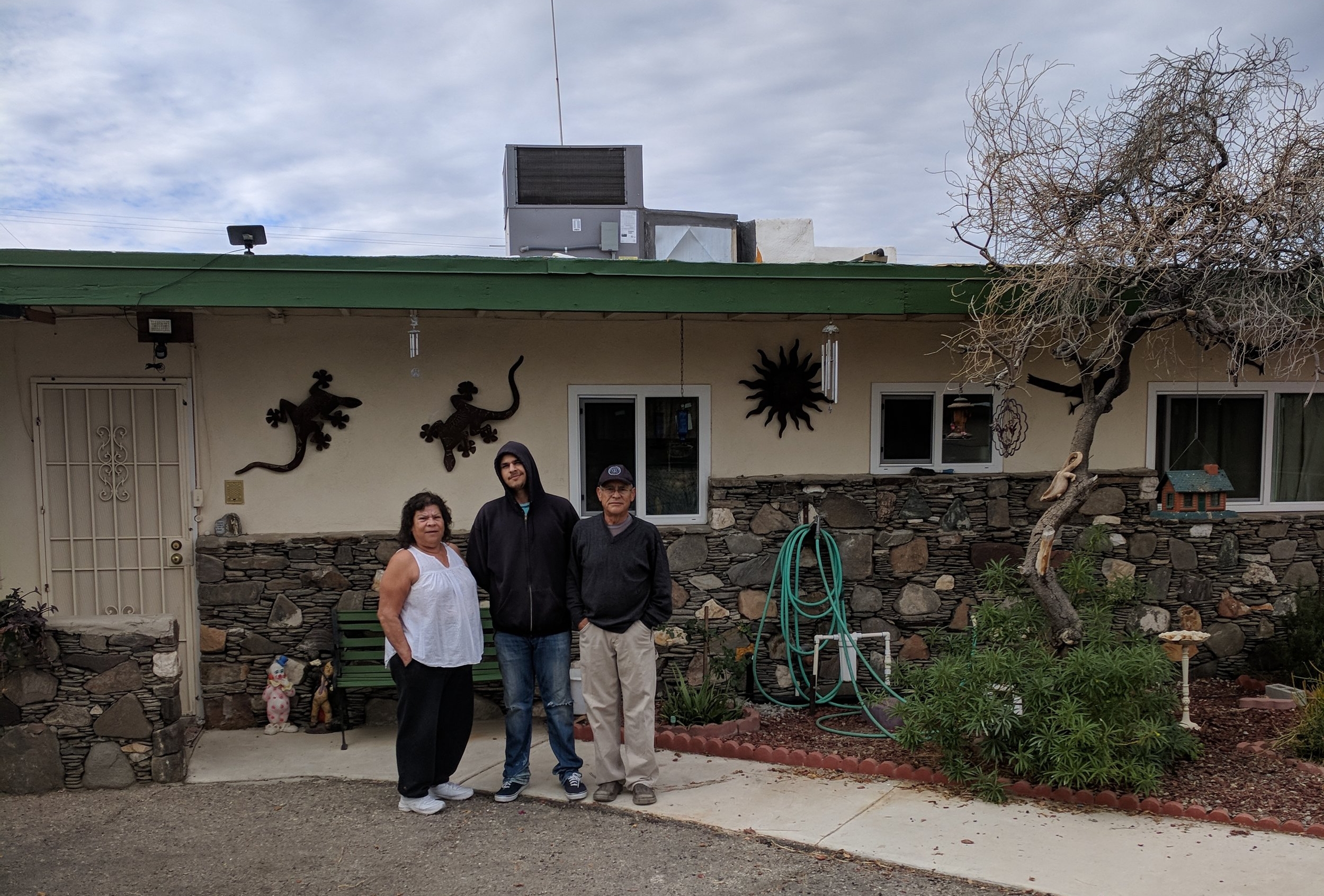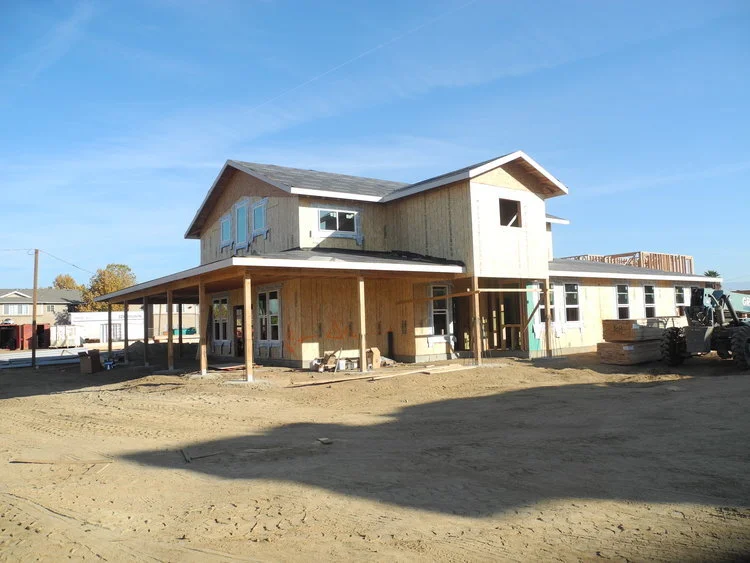Thanks to funding from California Climate Investments through the Low-Income Weatherization Program (LIWP), Rocio Hernandez and her family reduced their home energy costs by installing a new rooftop solar system and energy efficiency upgrades. At first, Mrs. Hernandez thought the referral flyer her husband brought home after work as a seasonal farmworker during the grape harvest in Delano was too good to be true. A local farmworker agency provided information about the LIWP Farmworker Housing Component, a California Climate Investment program focusing exclusively on the installation of energy efficiency measures and solar photovoltaics (PV) to reduce greenhouse gas emissions for farmworker households at no cost.
Woodstove Replacements Heat Homes in Butte County
More than 54 Butte County households have replaced their old woodstove or stove insert with a new, cleaner alternative that heats their home, improves indoor air quality, and reduces emissions of greenhouse gases, harmful particulates, and black carbon, a particularly potent climate pollutant, thanks to vouchers provided by the Woodsmoke Reduction Program. Among the residents who have benefitted from the program are Dennis and Deb, who replaced their 1979 woodstove insert, and Riki, who replaced the woodstove that came with their farmhouse, built before 1900.
Supporting Energy Efficiency and Clean Energy Generation in Multi-Family Farmworker Housing
People’s Self-Help Housing was awarded over $630,000 from the Low-Income Weatherization Program’s Multi‑Family Energy Efficiency and Renewables program to invest in the health and well-being of its low-income farmworker community in Santa Maria, known as Los Adobes de Maria. The homes of the 65 farmworker families living in Los Adobes de Maria will receive energy efficiency upgrades that will reduce energy consumption and lower their bills.
Supporting Families with Affordable Housing
Supported in part by nearly $23 million award from the Affordable Housing and Sustainable Communities Program, Resources for Community Development (RCD) will provide 87 affordable rental homes in the city of Berkeley through the Maudelle Miller Shirek Community project. In addition to large, family-sized apartments and permanent supportive housing for formerly homeless residents, the ground floor of the building will become the headquarters of Healthy Black Families, Inc., a South Berkeley-based nonprofit dedicated to the health of Black families in the community. This project will help Black families and formerly homeless individuals live healthier lives and receive health services through on-site programs and services offered by Healthy Black Families, Inc.,, RCD’s resident services, and the City of Berkeley Mental Health department and third-party service providers.
Woodsmoke Reduction Program Provides Efficient and Cost-Effective Heating
Water Energy Grants Provide Direct Benefits to Low-Income Households in Rural Counties
The Association of California Community and Energy Services partner agencies replaced 1,090 washing machines and 855 dishwashers with water- and energy-efficient machines . These energy and water savings will continuously provide cost savings across various communities in Kern, Madera, Contra Costa, Kings, San Francisco, and Merced counties and other low-income homes in San Mateo, Shasta, and Tehama counties.
San Gabriel Residents and Businesses Save Water and Energy with Appliance Rebates
Bringing Electrification and Energy Efficiency to Low-income San Francisco Communities
The Tenderloin Neighborhood Development Corporation’s (TNDC) commitment to help San Francisco’s low‑income communities thrive by building affordable housing was energized by an electrification project at its SOMA Studio and Family Apartments (SOMA Apartments) in 2020. The effort is supported by a $633,000 award from California Climate Investments through the Department of Community Services and Development’s Low Income Weatherization Program’s (LIWP) Multi‑Family component. With that money and contributions from other local energy efficiency programs, TNDC kept utility bills low for residents while electrifying major central building systems and reducing greenhouse gas emissions. Built in 2003, the SOMA Apartments include 162 homes with more than 60 percent of its households classified as extremely low‑income (earning less than 30 percent of the area median income).
Training and Partnerships Bring Community Solar to Low-income Households
Thanks to $2 million from California Climate Investments through the Low‑Income Weatherization Program, GRID Alternatives Inland Empire is implementing the Community Solar Pilot project, the first community solar array in California specifically designed to benefit low‑income households. Situated on Santa Rosa Band of Cahuilla Indian tribal lands in Riverside County, the Community Solar Pilot project will not only lower energy costs for tribal members and other low‑income households but also provided an opportunity for tribal members to gain valuable experience as solar installation trainees.
No-cost Energy Upgrades Serve Low-income Farmworker Households
Mrs. Rojas and her family now have a solar photovoltaic system and energy efficiency upgrades in their home, including a high efficient air conditioning system, new windows that minimize heat transfer, a smart thermostat, and other measures that reduce energy costs while improving the comfort and livability of their home and its resiliency to climate change.
Energy Efficiency and Solar PV System Brings Comfort and Affordability to Mecca Household
For years, Irma Vargas’ family of four struggled to pay the high utility bills that come with living on the north shore of the Salton Sea in Mecca while still maintaining a comfortable and healthy home for their children. The family’s limited income made the $400 per month bill nearly impossible during the summer months when temperatures can exceed 110°F in their Riverside County community.
Driving Clean Financing Assistance Program
The Community Housing Development Corporation, a community‑based organization in Richmond, received over $6.5 million from California Climate Investments for a pilot project to assist with the purchase of newer, cleaner cars in low‑income households in Sacramento and the Bay Area. The pilot project, known as Driving Clean Assistance Program, provides up to $5,000 for hybrid or plug‑in electric vehicle price buy‑down and up to an additional $2,000 for electric vehicle service equipment. The pilot enables low‑income individuals and families, who would otherwise not qualify for a loan due to credit challenges, to obtain a loan at competitive rates. This transformative initiative includes credit counseling, budget counseling, and financial education.
Clean Mobility Options Connect Rural Communities with Reliable Transportation
Transform Fresno Initiative Brings Solar and Energy Efficiency Projects to Low-income Households
Community Members Lead Transformative Climate Solutions in Southwest Fresno
Low-income Weatherization Program Helps Casas de la Viña Residents Save Money and Energy
Dana Guzman is a resident of Casas de la Viña, a 56-unit affordable apartment rental community that serves low-income families and farmworkers. The mother of two boys, Dana moved to Casas de la Viña when she needed to find a new home. Self-Help Enterprises was able to install solar photovoltaic (PV) systems and make energy efficiency improvements at Casas de la Viña with Cap-and-Trade dollars.
Weatherization & Solar PV Project Benefits Low-Income Sacramento Residents
After facing increasingly unaffordable energy bills year-after-year, Milton, a Sacramento County resident, learned about the State’s low-income solar program offered through the Sacramento Municipal Utility District (SMUD). He became interested in the program and was one of many residents that benefited from this assistance
Clean Cars 4 All Vouchers Support Low-income Bay Area Households
Adaptive Reuse Brings Affordable Housing, Walkability, and Community Arts Space to Santa Ana
In June 2020, artists, their families, and low‑income earners in Santa Ana began moving into new affordable homes funded in part by a $12 million award from California Climate Investments through the Affordable Housing and Sustainable Communities program. In partnership with the Southern California Association of Governments, the Santa Ana Arts Collective development promotes sustainability and health through active transportation safety activities, supported by over .5 miles of bicycle facility improvements and 36 improved pedestrian crossings. The project also features a gallery space for resident and community artists, and Meta Housing is partnering with Western Community Housing to deliver on‑site adult education services.
Building Affordable Housing and Transportation Improvements in Dinuba
As early as this summer, Sierra Village will offer 44 affordable homes with easy access to bike lanes and sidewalks in the rural community of Dinuba. This apartment rental community will not only bring an affordable housing option to hardworking low-income families, but it will also feature a vanpool program and other transportation improvements, solar and water conservation features — all of which are designed to reduce GHG emissions.






















